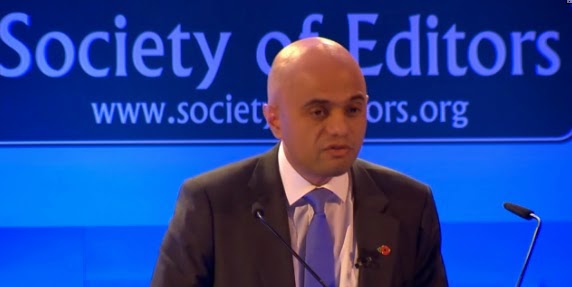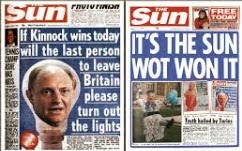Liberty in a statement: "Article 10 of our HRA, freedom of expression, and the Strasbourg court have long acted as vital defenders of reporters and their sources. However, the so-called 'British Bill of Rights' would diminish the rights of everyone in Britain, including reporters – leaving the already powerful freer to act with impunity. And it’s only the lax laws and lousy surveillance policies of successive Governments that have allowed the authorities to snoop on such sensitive sources in the first place. That’s precisely why The Sun is currently relying on Article 10 in its complaint over the Metropolitan Police’s obtaining of its journalists’ telephone records."
IPSO chairman Sir Alan Moses, speaking at the Society of Editors' conference: “Proper, successful independent regulation will not be established by manic firing of a big bazooka (a fine)… and anyway we don’t know how to fire it.”
Eastern Daily Press editor Nigel Pickover on relations with the police, at the Society of Editors' conference, as reported by HoldTheFrontPage: “We are lied to on a regular basis…we are made to feel like the enemy when really we are on the same side."
Jack of Kent @JackofKent on Twitter:
2012: News International figures warn Leveson of prior restraint injunctions.
2014: News International journalist seeks such an injunction.
The Grey Cardigan on The Spin Alley: "IN MOST towns and cities in Britain, the editor of the local newspaper used to be a man of significance; a figurehead of the community, a person to be looked up to. You could see it at school fetes and WI coffee mornings, town council meetings and business forums. This due – or perhaps undue – reverence gradually diminished as first children in suits began to get the top jobs, and then as the position itself began to be ‘rationalised’, leaving the local newspaper to be run by a stranger on an industrial estate 30 miles down the road."
Northern Echo editor Peter Barron blogs about his paper's special Remembrance Sunday edition "Newspapers still have their place, and it is an important place too. We should acknowledge their faults and apologise sincerely when mistakes are made. But we really should love newspapers, protect them, and never underestimate the work and care that goes into producing them - especially on days like this."
Olenka Frenkiel in the Guardian on women and ageism at the BBC: "Only Miriam O’Reilly – braver than the rest – had fought the enormously powerful BBC and won. And even after she’d won and the BBC had expressed contrition and promised change, inside the BBC, they were still doing it. Nothing had changed. Nothing except for the ever bigger and tighter gagging clauses BBC lawyers were demanding we sign preventing us from discussing why we’d left. Not to reveal how we’d been forced out. That’s when I protested. I loved the BBC. I still believed in it as a beacon of free speech and open debate. It was supposed to be an equal opportunities employer, opposed to discrimination of all kinds. This was now a matter of public interest ripe for a vigorous airing with participants from all sides.The gagging clauses were there to prevent exactly that."
Matthew Parris in The Times [£]: "The personal attacks on Mr Miliband are lazy, evasive and rather cowardly: a kind of displacement activity for people stumped for ideas as to what their dream leader would actually do, and falling back on shin-kicking an inexperienced and somewhat maladroit leader for a gap that he is powerless to fill. We in the media, too, are being shallow about this. Once the world has got it in for somebody, once their 'haplessness' is the big story and journalists clamour to reinforce it, there will never be a shortage of trivial incidents to giggle or gasp at. People must eat, and sooner or later the cameras will find a mouth and a bacon roll, just as with David Miliband (when we were casting him as hapless, rather than a lost leader) we once found a banana."
Roy Greenslade in the Guardian: "There is nothing new about pre-electoral anti-Labour propaganda in Tory-cheerleading newspapers. It is part of Britain’s post-war political history stretching back to Clement Attlee.Every Labour leader – with the single exception of Tony Blair – has suffered. Three modern leaders were subjected to especially harsh treatment. Gordon Brown was scathingly lampooned in 2010 as a ditherer, with papers giving huge coverage to supposed plotters within the party. Neil Kinnock was savagely mocked in 1992 as 'the Welsh windbag' among many other insults about his competence. Michael Foot was witheringly derided for his inappropriate dress sense as well as his political stance in 1983. There was a grain of truth in each case, but the attention paid to the various misrepresentations of their characters was disproportionate."
David Wooding @DavidWooding on Twitter: "Ed Miliband's aides really must stop blaming the messenger over plight of their leader. Newspapers are only reporting what his MPs tell us."
[£]=paywall














No comments:
Post a Comment